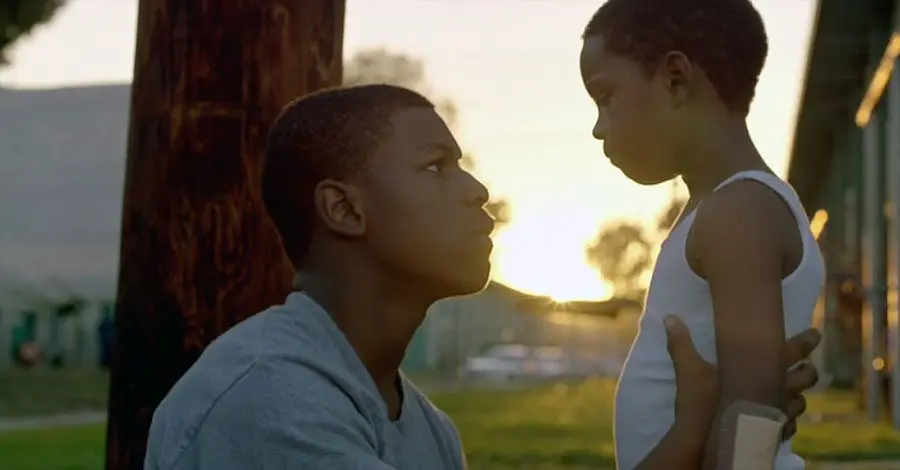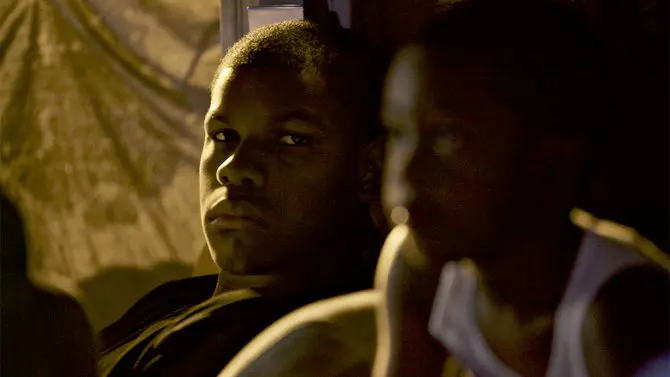Imperial Dreams was actually released at the Sundance Film Festival in 2014. Based on research it did not make strides in terms of distribution. Whiplash probably did not help matters, as it owned the festival. In February 2017, Netflix, the platform that appears to have its fingers in so many pies, distributed it as one of their own, and behold: it became a Netflix Original. Imperial Dreams became the preliminary platform for John Boyega.
Yes, he did have a career before he was thrown into the Star Wars franchise. He was not just plucked from nowhere, apparently. This really is his film. Something that you can find at the bottom of his drama school locker and now lives as a thumbnail on Netflix, ready for any passerby to consume.
John Boyega plays lead character Bambi, a reformed gangster, who has just been released from prison. He returns to Watts, Los Angeles and nothing has changed. It is still violent, still treated by the police as the projects, and those associated with him before are still the same. His family is the priority, his loyalty is clear, and he wants to ensure a safe and prosperous future for his son.
The entire premise is the willingness of Bambi to not get consumed by the life he had before, which means sacrifices and testing relationships. The movie is an American drama, one that you would expect. We’ve seen it before and it has the usual, generic components, but the story is interesting. We all like a movie that demonstrates a character’s struggle. There’s more for John Boyega to do in this film to sell a story, and he does deliver.
The movie clearly delivers an undesired setting where the community that Bambi is associated with are socially repressed. The characters all make it known that survival is key and the narrative sounds out a few themes; the system going against them, lack of education or the opportunity for a decent one, racial profiling by the police, and the war on drugs. The film showcases Bambi trying to release himself from the life of crime by becoming a writer, which to him feels almost impossible. It sounds almost poetic if you think about it.
A former gangster, who delved into a life of drugs and crime, exits from prison trying to make a living from writing within a system that spits you back into prison if you do not have the financial security to save yourself. Bambi romanticizes the idea that it can happen eventually, but the movie must know as an audience member that his ambition almost feels impossible from where he is growing up. You can feel the uncertainty of it all every time a criminal opportunity presents itself, or when he gets pressure from one of his peers. The goalpost only remains in his sight because of his son, but even then, as an audience member, you become doubtful as to whether the easy way out may be the choice that he makes.
The easy way out being committing crime to earn himself the financial security. There is one scene in particular that reminds me of a scenario in I, Daniel Blake where Bambi goes to a government office to get back his drivers license, but he can’t because he is in $15k of child benefit debt, a burden he was not aware of. They cannot permit him a new license until he wipes the debt, but he cannot get a job unless he has a license.
What a painfully dumb issue, but one where you can almost forgive him if he decided to take part in a crime that can offer him a few thousand. Certain members of his family are part of the problem; they do not agree with his new, clean life, which leads to the most intense moments in the film.
These scenarios are forced upon him throughout, but the objective of the movie is to show that without rehabilitation support, you are climbing out of a deep dark hole, meaning you have to be mentally stern to clamber out of it. Bambi is the core character in this movie and the other characters are just the components to represent this problem. Out of the frying pan and into the fire comes to mind. This is a good movie.
All of the above would not have been possible without a decent performance from Boyega, who manages to situate himself as a character that is trying to become an anomaly in his community. He does that by purposefully ensuring that his emotional outlet looks limited. There are moments where you feel his character is due a breakdown, and there’s no lack of aggressiveness from his peers when situations are not going his way.
At times you think – is he going to finally blow? Despite his enthusiastic and good delivery in Star Wars, it is encouraging to watch a movie of his that was released prior to his fame, because it is obvious that he will be able to put in great performances in standalone movies in the future.
At times Imperial Dreams’ dramatic tone suffocates the narrative slightly. I mentioned earlier that the movie comes across generic at times. The delivery of the dialogue sometimes over explains their situation, coupled with the narration of Bambi. The movie wants you to know that everyone is a gangster and that everything is about survival.
On the surface that comes across loud and clear but I feel, at times, that you do not need to make the obvious so obvious. Do you understand where I am coming from? The setting itself speaks volumes, it is the projects and it is not a living situation. We see it in the news and other media forms all the time. The strength of the movie is Bambi suffering from themes I highlighted before. Where the police follow him without reason or when he cannot get a driving license. Those are the moments that make the film more important, and I wanted those themes to come forth more often.





